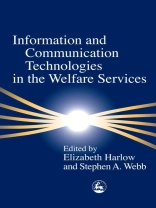Information technology is changing the role, responsibilities and practices of social care professionals, as well as policy and management within the field. Bringing together leading academics to discuss the application of new information technology (IT) in health and social care, this text examines a variety of technologies, including the Internet, multimedia and online communities.
The contributors take a balanced approach, highlighting the anxiety and unease as well as the advantages brought about by these developments in technology and the resulting change in responsibilities. They also explore the wider implications of the changes in relations between experts, professionals and lay people that technology has brought about.
Discussing issues such as child abuse and the Internet, computer mediated self-help and collaborative learning, Information and Communication Technologies in the Welfare Services is a ground-breaking book in the field of social care, bringing well-researched and up-to-date discussion of all aspects of information technology to those working and studying in health and social care.
Table des matières
Introduction: Information and communications technologies in the welfare Services: Wired Wonderland or Hypertext Hell? Elizabeth Harlow, University of Bradford. Part 1. Social Work and Social Care. 1. The Caring Professions and Information Technology: In search of a theory. Nick Gould, University of Bath. 2. Using the Internet for Evidence Based Practice. Mark Watson, National Institute of Social Work. 3. Real Records, Virtual Clients. Annie Huntington, University of Salford and Bob Sapey, University of Lancaster. 4. Technology and systems of referral taking in Social Services: From Narrative to Code. Suzanne Regan, University of Lancaster. 5. Internet Child Abuse. Brian Relph, Luton Borough Council Children Service and Stephen Webb, University of Bradford. Part 2. Health and Welfare. 6.Information Technology and the Organisation of patient care. Walter Sermeus, University of Leuven. 7. Health, collaborative learning and the collapse of professionalism? The Information Brothel Joe Cullen, The Tavistock Institute. 8. From Self-Service Welfare to Virtual Self-Help. Nicholas Pleace, University of York, Roger Burrows, University of York, Brian Loader, University of Teeside, Sarah Nettleton, University of York and Steve Muncer, University of Durham. 9. Consumers, the Internet and Reconfiguration of expertise. Michael Hardey, University of Southampton.10. Conclusion: Technologies of Care Stephen Webb, University of Bradford. References. Index.












